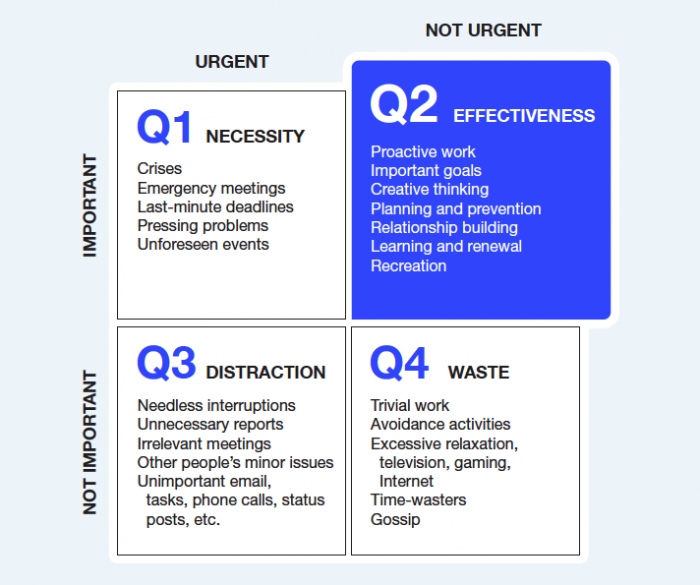Manage Your Time and Energy Effectively

When there’s too much to do, some things on your task list will inevitably remain undone. You can frantically try to do everything and wait to see which things fall through the cracks—or you can give yourself a reprieve by deciding ahead of time what to prioritize.
Define (or redefine) your priorities.
When you know which tasks are most important to your organization’s mission and values, you can put first things first. Take the time to determine both the importance and the urgency of action items on your list, and then proactively carve out time for tasks that are most important—especially those that are less urgent and prone to fall off your radar. Other tasks can be delegated, postponed, or deprioritized altogether.

The FranklinCovey Time Matrix®
The Time Matrix is a tool for triaging every activity through the Thinking brain, with a bias towards things that are important – but not urgent (The Q2 quadrant of extraordinary productivity). The more time we can spend in Q2, the less we’ll be dealing with other people’s urgencies.
Clarify goals and expectations.
Some leaders worry that if they can’t see their people working, nothing is getting done. But even when there is a clear line of sight and people are working hard, there’s no guarantee that they’re working effectively.
If a leader hasn’t set clear goals and expectations, then their team might be working really hard, but that’s not the same thing as productivity. The goal is not to work hard but to make progress toward specific goals aligned with your organization’s mission.
When goals and measures are clear, leaders don’t need to monitor or control people to know whether they’re getting things done. They can simply follow up on objectives and performance indicators regularly to gauge progress. Individuals can also initiate conversations about prioritization and take ownership of their own effectiveness, empowering them to organize their work in more productive ways.
The Most Trusted Leadership Company
Learn how your organization can use our people, content, and technology to create collective action and meaningful change.

Take responsibility for your well-being.
When your office is your home and you have little in-person interaction or downtime associated with a commute, it can be easy to constantly work without noticing when your energy is being depleted. Self-care is the foundation for productivity and satisfaction, but it can also be challenging to prioritize consistently, especially during times of high pressure and rapid change.
“Remote work gives individuals greater freedom and yet greater responsibility to care for themselves,” says Adam Merrill, executive vice president of market and customer intelligence. Each person needs to identify boundaries, whether that means not checking email in the evenings, taking a lunch break, or saying no to side projects. The Five Energy Drivers also provide a helpful framework for ensuring your body and brain get the things they need, such as food, exercise, sleep, and time to relax.
If you have access to the FranklinCovey Impact Platform, click here for additional information about defining priorities, individual goals, and resilience and well-being.
If you don’t have access to the Impact Platform, please contact your client partner.








